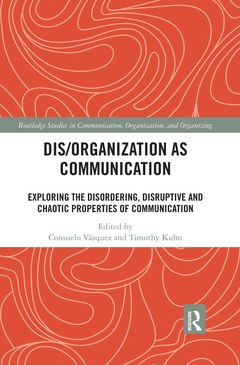Dis/organization as Communication Exploring the Disordering, Disruptive and Chaotic Properties of Communication Routledge Studies in Communication, Organization, and Organizing Series
Coordonnateurs : Vásquez Consuelo, Kuhn Timothy

This book accounts for the transformation of organizations in a post-bureaucratic era by bringing a communicational lens to the ontological discussion on organization/disorganization, offering a conceptual and methodological toolbox for studying dis/organization as communication.
Increasingly, scholars acknowledge that communication is constitutive of organization; because meaning is always indeterminate, communication also (and simultaneously) generates disorganization.
The book synthesizes the major theoretical trends and empirical studies in communication that engage with dis/organization. Drawing on dialectics, relational ontologies, critical theory, systems theory, and affect thinking, the first part of the book offers communicational explanations of how dis/organization unfolds. The second part of the book grounds this theoretical reflection, providing empirical studies that mobilize diverse methodological and analytical frameworks (e.g., ethnography, situational, interactional and genre analysis) for studying the practices of dis/organization. Overall, the book exposes organizations (and organizing processes) as significantly messier, irrational (or a-rational), and paradoxical than scholars of organization typically think. It also offers readers the conceptual and methodological tools to understand these complex processes as communication.
This book will be essential reading for scholars in organizational communication or management and organization studies, together with senior undergraduate and graduate students studying organizational communication, organizational discourse, discourse analysis (including rhetoric, semiotics, pragmatism, narratology) and courses in management studies. It will also be richly rewarding for organizational consultants, managers and executives.
Introduction
Part I
Communicational Explanations of Dis/Organization
1 Constituting Order and Disorder: Embracing Tensions and
Contradictions
Linda L. Putnam
2 Communication as Dis/Organization: How to Analyze
Tensions from a Relational Perspective
François Cooren and Pascale Caïdor
3 The Queen Bee Outlives Her Own Children: A Luhmannian
Perspective on Project-Based Organizations (PBOs)
Michael Grothe-Hammer and Dennis Schoeneborn
4 Rethinking Order and Disorder: Accounting for
Disequilibrium in Knotted Systems of Paradoxical Tensions
Gail T. Fairhurst and Mathew L. Sheep
5 Feeling Things, Making Waste: Hoarding and the
Dis/Organization of Affect
Karen Lee Ashcraft
6 Communication Constitutes Capital: Branding and the
Politics of Neoliberal Dis/Organization
Dennis K. Mumby
Part II
Methodological Toolbox for Studying Dis/Organization
7 Dis/Ordering: The Use of Information and Communication
Technologies by Human Rights Civil Society Organizations
Oana Brindusa Albu
8 Disorganizing Through Texts: The Case of A.K. Rice’s
Account of Socio-technical Systems Theory
Anindita Banerjee and Brian Bloomfield
9 The Paradox of Digital Civic Participation: A
Disorganization Approach
Amanda J. Porter and Michele H. Jackson
10 Organizing from Disorder: Internet Memes as
Subversive Style
Peter Winkler and Jens Seiffert -Brockmann
11 Extreme Context as Figures of Normalcy and Emergency:
Reorganizing a Large-Scale Vaccine Campaign in the
DR Congo
Frédérik Matte
Consuelo Vásquez is an Associate Professor in the Département de Communication Sociale et Publique at the Université du Québec à Montréal, Canada. Her research interests include ethnography, project organizing, volunteering and the communicative constitution of organizations. Her work appears in such venues as Communication Theory, Human Relations and Qualitative Research in Organizational and Management.
Timothy R. Kuhn is Professor in the Department of Communication at the University of Colorado Boulder, USA. His research addresses the constitution of authority and agency in organizational action, with particular attention to how knowledge, identities, and conceptions of value emerge in sociomaterial, power-laden communication practices. His research has been published in Organization Studies, Academy of Management Review, Academy of Management Annals, Organization, Management Communication Quarterly, and Communication Monographs, among others.
Date de parution : 12-2020
15.2x22.9 cm
Date de parution : 03-2019
15.2x22.9 cm
Thèmes de Dis/organization as Communication :
Mots-clés :
Rice’s Representation; Vice Versa; organizational studies; Western Sahara; organizational management; Vaccine Campaign; CCO; Socio-technical System Theory; constitutive; Internet Memes; disorganization; LA School; ontology; Rice’s Text; empirical studies; MSF Representative; practices; Circle Foundation; methodology; Digital Voting; theory; Health Delegate; research; ICTs Create; Extreme Contexts; DR Congo; Communication Episodes; Process Oriented Approaches; Funding NGO; Voting Technology; PBO; Rice’s Account; Keypad Polling; Paradoxical Tensions; Capital Accumulation Process; Weaving Shed



